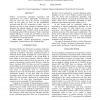Free Online Productivity Tools
i2Speak
i2Symbol
i2OCR
iTex2Img
iWeb2Print
iWeb2Shot
i2Type
iPdf2Split
iPdf2Merge
i2Bopomofo
i2Arabic
i2Style
i2Image
i2PDF
iLatex2Rtf
Sci2ools
114
click to vote
ISBI
2009
IEEE
2009
IEEE
Accelerating Regularized Iterative CT Reconstruction on Commodity Graphics Hardware (GPU)
Iterative reconstruction algorithms augmented with regularization can produce high-quality reconstructions from few views and even in the presence of significant noise. In this paper we focus on the particularities associated with the GPU acceleration of these. First, we introduce the idea of using exhaustive benchmark tests to determine the optimal settings of various parameters in iterative algorithm, here OS-SIRT, which proofs decisive for obtaining optimal GPU performance. Then we introduce bilateral filtering as a viable and cost-effective means for regularization, and we show that GPU-acceleration reduces its overhead to very moderate levels.
GPU Acceleration | ISBI 2009 | Iterative Reconstruction Algorithms | Medical Imaging | Optimal Gpu Performance |
| Added | 19 May 2010 |
| Updated | 19 May 2010 |
| Type | Conference |
| Year | 2009 |
| Where | ISBI |
| Authors | Wei Xu, Klaus Mueller |
Comments (0)

